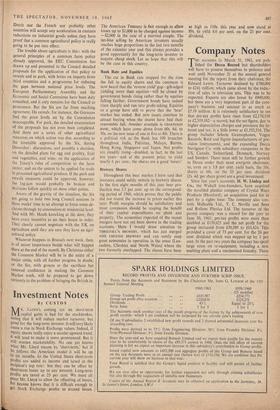Investment Notes
By CUSTOS
MR. LLOYD'S coming tax on short-term capital gains is bad for the stockbroker, seeing that it will reduce market turnover, but good for the long-term investor. It will very likely cause a rise in Stock Exchange values. Indeed, if equity shares really enjoy a secular upward trend, it will tend to make it more pronounced. But it will worsen marketability. No one yet knows What Mr. Lloyd means by `short-term,' but if he follows the American model it will be up to six months. In the United States short-term Profits are added to income and taxed at the recipient's top rate : but they can be offset by short-term losses up to any amount. Long-term Profits are taxed at 25 per cent. We must all Press Mr. Lloyd to allow the offsetting of losses, for heaven knows that it is difficult enough to get Stock Exchange profits to exceed losses.
The American Treasury is fair enough to allow losses up to $1,000 to be charged against income —$2,000 in the case of a married couple. The tax-loss selling by American investors usually reaches huge proportions in the last two months of the calendar year and this always provides a good opportunity for the long-term investor to acquire cheap stock. Let us hope that this will be the case in this country.
Bank Rate and Equities The cut in Bank rate stopped for the time the fall in equity shares and the comment is now heard that the 'reverse yield' gap—gilt-edged yielding more than equities—will be closed by government bonds rising rather than by equities falling further. Government bonds have indeed risen sharply and run into profit-taking. Equities as a group have still to prove that the 'bear' market has ended. But new issues continue to attract buying when the shares have had their reasonable fall. Another example is CHARTERED BANK, which have come down from 60s. 6d. to 50s. on the new issue of one in five at 40s. There is a political risk as the Bank has 190 branches throughout India, Pakistan, Malaya, Burma, Hong Kong, Singapore and Japan. Net profits arc steadily rising—doubled, in fact, in the last ten years—and at the present price, to yield nearly 6 per cent., the shares are a good 'mixer.'
Brewery Shares Throughout this bear market I have said that investors could safely remain in brewery shares. In the first eight months of this year beer pro- duction was 5.7 per cent. up on the correspond- ing period of 1960, which proves that the public did not resent the increase in prices earlier this year. Profit margins should be satisfactory and most companies should be reaping the benefit of their capital expenditures on plant and property. The economies expected of the recent mergers have not yet been shown in the trading accounts. Here I would draw attention 'to THRELFALL'S BREWERY, which has just merged With CHESTER BREWERY and can surely reap great economies in operation in the areas (Lan- cashire, Cheshire and North Wales) where the two formerly overlapped. The shares have been as high as 110s. this year and now stand at 89s. to yield 4.6 per cent. on the 21 per cent. dividend.










































 Previous page
Previous page